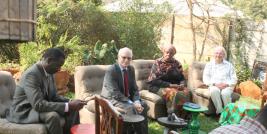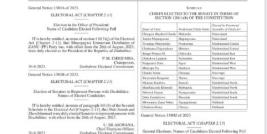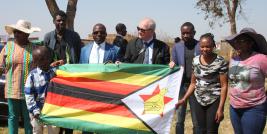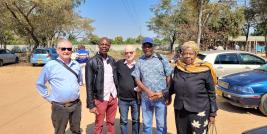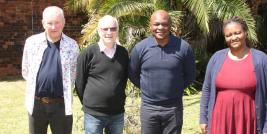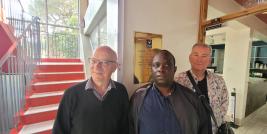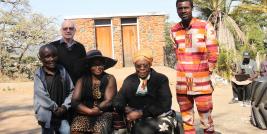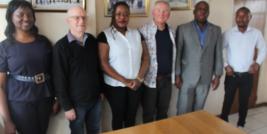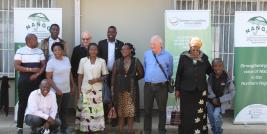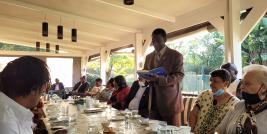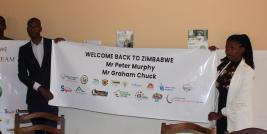Zimbabwe Information Centre (ZIC), Sydney, Australia Interview –
An anonymous ‘senior government official’ is the source for a report in The Independent on Friday January 31, 2020, that the Zimbabwe cabinet has rejected a proposal from Finance Minister Mthuli Ncube for Zimbabwe to become a member of the Extractive Industries Transparency Initiative (EITI).
In October 2019 the Chair of EITI, Ms Helen Clark, had visited Harare for two days in response to interest expressed by EITI members, and Mr Ncube had expressed interest in joining EITI in his November Budget speech.
The official claimed that EITI was set up by former British Prime Minister Tony Blair and that it was a “Western initiative being thrust upon us”, that it was a negative like the Kimberley Process for conflict diamonds, and that when she visited in October, Ms Clark spoke to “several civil society organizations which are not trusted by the government”.
This last can be interpreted as an attack on the Zimbabwe Peacebuilding Initiative (ZimPI) which had come to the rescue to assist Helen Clark’s senior Africa Representative Mr Baide Mamadou Bady, to obtain a visa which had initially been blocked. ZimPI assisted Ms Clark’s delegation to be received into Zimbabwe by Government as a visiting VIP, with successful meetings organised with both Vice President Mohadi and Foreign Minister Hon SB Moyo, concluding with a very good and positive official press coverage.
Ms Clark was Prime Minister of New Zealand from 1999-2008, and Administrator of the United Nations Development Program from 2009-2017.
On Saturday February 1, 2020, Ms Clark replied to The Independent reporter, Andrew Kunambura, to firmly correct totally false assertions in his report, and to clarify the objectives of EITI.
“My concerns include,” she wrote:
- the suggestion that I had ‘visited Zimbabwe in October last year and embarked on a two week long advocacy spree for the adoption of the initiative’. I visited Zimbabwe for barely 48 hours.
- The suggestion that I ‘took some {Zimbabwe} officials to the South Island of New Zealand’. I did no such thing.
- The suggestion made that EITI ‘is a Western initiative being thrust upon us and Cabinet felt it was necessary to have a closer look at it since it is coming from people who are imposing sanctions on us’.
“On that - let me state for the record that EITI membership is overwhelmingly comprised of developing countries, 24 of which are members of the African Union. Countries make their own decisions to join based on their own assessment of whether it has utility for them. Membership is not thrust upon any country. A link to details on the membership is here: https://eiti.org/countries.
“I would also make the point that EITI has no connection with any decisions with respect to sanctions.
“EITI has no desire to be entangled in political discussion within Zimbabwe. Our October mission was mounted in good faith because of the interest in EITI in the country, including as expressed in the Budget statement of the Minister of Finance last year. It is over to Zimbabwe to assess if, how, or when it would like to take the matter forward.
“I am most concerned that EITI and its mission to Zimbabwe have been publicly maligned and misrepresented in the article, and would ask for a correction based on the information I have provided here”.
Former Senator Sekai M Holland, founder and Chairperson of the ZimPI, emphasised the need to correct the report in The Independent because once again negative voices of distortion, misrepresentation of facts and downright lies have reared their ugly head to cause deliberate confusion in Zimbabwe, isolated as the country is from the international community, when Zimbabweans need to take the hand of friendship offered by Ms Clark and EITI to re-join the international community.
“When I was a co Minister of State in the Inclusive government from 2009-13 I was assigned in ONHRI to explain to the international community the damage which the sanctions had been doing to Zimbabwe since they were imposed after the 2002 elections, and we went a long way towards having the sanctions lifted.
“But other powerful forces benefit from the country’s isolation. These moved to end the Inclusive Government. At the 31st July 2013 elections they succeeded,” Mrs Holland said. “But we have not given up on our efforts to end the international isolation of our country. As ZimPI we appreciate the AU and SADC positions, who have taken the lead to argue that sanctions are harming our Second Republic’s efforts to rebuild the economy.
“As Civil Society organisations we need to sit down together to find common ground, of which there is an abundance, if we work with fact-based evidence, and engage in solutions-based conversations across all divides. We must also educate ourselves to speak with one voice on the issues we face as a nation, highly polarised, in a process of atomisation, of selves, of families, communities, institutions of our society, since our occupation in 1890,” said Mrs Holland.
“As Zimbabweans we have not given ourselves the opportunities open to us to deliberate together, in spite of all the tools our people have accumulated over our history and available to us, to bring us together, to build an inclusive society, which we have the capacity to achieve.
“We boast of an educated population, but have not taken into account our rich positive cultural beliefs embodied in uBuntu, and clear traditional channels of resolving conflict, which our traditional leaders utilise daily to keep the grassroots based fabric of our society intact: ukukhumelanu’mlotha (Ndebele), Kusutisana fodya (Shona); Truth, Justice and Forgiveness, the three stages to achieve reconciliation.
“If we continue to choose to take the route we are on now of conflictual relations, and we continue to fight against all those that do not agree with us in civil society as in politics, we will keep ourselves in limbo for years to come”, said Mrs Holland.
While the British government played a significant role in initiating EITI, Tony Blair in particular played no role in the imposition of sanctions on Zimbabwe.
“It was former President Mugabe who pulled Zimbabwe out of the Commonwealth during the Abuja CHOGM, in the face of great resistance from the old white Commonwealth members,” said Mrs Holland. “Both in Coolum in Australia and in Abuja in Nigeria, they told us clearly when we lobbied the whole of CHOGM, that they were following the lead of the Africans in the Commonwealth on what to do on Zimbabwe”.
There were open public clashes between Tony Blair and Zimbabwe’s former president Robert Mugabe. A specific disagreement between BP and the Angolan government, about BP reporting a massive signing bonus payment by Angola, triggered serious efforts to find workable reporting systems for both petroleum companies and governments.
At a conference in London in June 2003, a Statement of Principles to increase transparency of payments and revenues in the extractive sector was agreed. These 12 EITI Principles centred on the need for transparent management of natural resources. Then Nigeria, Azerbaijan, Ghana, and the Kyrgyz Republic explored how these principles might be applied. They were later joined by Peru, the Republic of Congo, Sao Tome e Principe, Timor Leste, and Trinidad and Tobago. It is this group of countries which Zimbabwe is considering joining, but last week’s The Independent report is a concerted effort to torpedo this possibility.
Mrs Holland explained that as ZimPI she had met the Minister for Mines soon after Ms Clark’s visit, to understand the Government’s position on EITI. Minister Chitando, a technocrat, was clear that the Government had to base any decision it took on factual information about benefits to Zimbabwe in joining EITI. He had sent two Ministry officials to Addis Ababa where EITI was holding its conference. The Minister was awaiting their report.
“Our President Mnangagwa inherited a country that had undergone brutal episodes of unresolved conflicts for generations. He is trying against all odds, to get Zimbabwe to be a full player in the international community,” said Mrs Holland.
“His strategy is to restore order, restore systems. He is working to unite the people as he takes each delicate step to move the country forward. He doesn’t want our people fighting each other and going backwards. He wants to provide the country with a leadership that is united in peace, and a society moving forward, together,” concluded Mrs Holland.
Zimbabwe Information Centre, Australia
February 4, 2020

